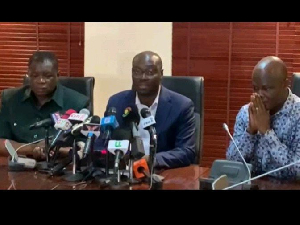



The ongoing discussion over the nation's fiscal responsibility and the government's spending priorities is brought to light by Dr. Forson's worries. The Minority Leader has said that the €140 million decision to buy ships is needless and could put an excessive strain on Ghana's resources, which has caused controversy.
The Minority's position on the matter demonstrates their dedication to maintaining the nation's economic stability. In order to safeguard Ghana's financial stability and keep future governments from inheriting unmanageable debts, Dr. Forson is opposed to tax breaks and loans that would put further pressure on the nation's budget.
Dr. Forson has questioned the rationality of making such a large investment as the current government gets ready to leave office, raising concerns about the timing of the proposed ship purchase. He has urged caution while making decisions, arguing that any significant financial commitments should be reviewed and approved by the incoming administration.
On the other hand, Dominic Nitiwul, the minister of defence, has defended the acquisition of the ships by pointing out how crucial they would be to the Navy's operations. Additionally, he has cited the IMF's approval of the loan request as evidence of global backing for the project. He has, however, stated unequivocally that even in the event that the Minority does not support the purchase, the administration is willing to move forward with it.
Important issues regarding the government's spending objectives and the necessity of decision-making transparency are brought up by the ongoing controversy around the ship acquisition. All financial decisions must be well thought out and in the best interests of Ghana's long-term economic stability as the country gets ready for a handover of power following the next elections.
The choice to move forward with the ship purchase will ultimately have a significant impact on Ghana's financial situation and capacity to achieve its development objectives. The Minority's worries highlight how crucial strict control and accountability are to guaranteeing the prudent and responsible use of public monies. It is evident from the ongoing discussion that Ghana's political leaders and decision-makers will continue to place a high priority on the topic of fiscal discipline in the months to come.